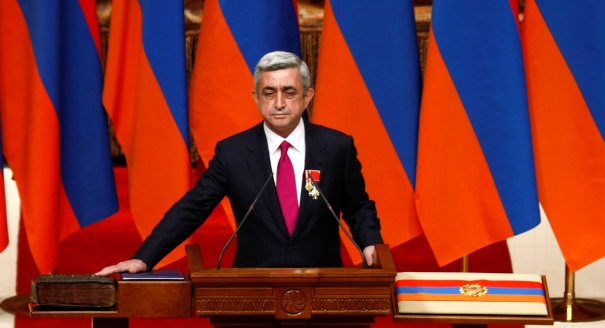In the classic film Lawrence of Arabia there is a famous exchange between two British officers. Damascus is burning and one turns to the other and says, “Look, sir, we can't just do nothing.” The other, General Allenby, replies, “Why not? It’s usually best.”
Sometimes doing nothing can look like the smartest political move. In Armenia, it seems to be the favorite political tactic of President Serzh Sargsyan.
Sargsyan was reelected for a second five-year term this spring. International monitors said the vote was mostly fair—although the political playing field as a whole evidently was not. He faced an unexpected last minute surge from opposition politician Raffi Hovannisian, who collected an impressive 36 percent of the vote almost out of nowhere. But Hovannisian failed to catalyze a protest movement in the wake of the polls.
Sargsyan is now firmly in control of all institutions in Armenia, from the police to local government to television. If he looks out at Georgia, Turkey or Iran, he will feel fairly comfortable by comparison.
But the most frequent comment I heard in Yerevan was “the government is doing nothing with all this control.” The problems the election exposed are not going away. Inflation is rising, with food prices going up especially sharply and Armenia’s worst socio-economic problem, emigration, has picked up speed again.
Why do so little? In part because of the age-old Number One priority of all ruling elites—preserving their own power. In part because of a fear of upsetting the status quo both domestically and internationally. Armenia is a country where domestic and foreign policy are closely intertwined. To be leader of the country, you need to deal with Russia, which is Yerevan’s military and economic patron, with the diaspora in many countries around the world and with the sometimes different opinions of the Armenians of Karabakh, who are situated on the front-line of an unresolved conflict with Azerbaijan.
Before the end of the year however, President Sargsyan is going to have to publicly make a decision on President Putin’s Eurasian Union project—while also seeking to sign an Association Agreement with the European Union. Russian pressure is being applied. A former Russian ambassador to Yerevan warned the Armenians rather crudely that choosing the European Union way was a “slippery path.”
On this issue inertia will not be enough. To the Armenian elite’s discomfort a “yes” or “no” will be required.
